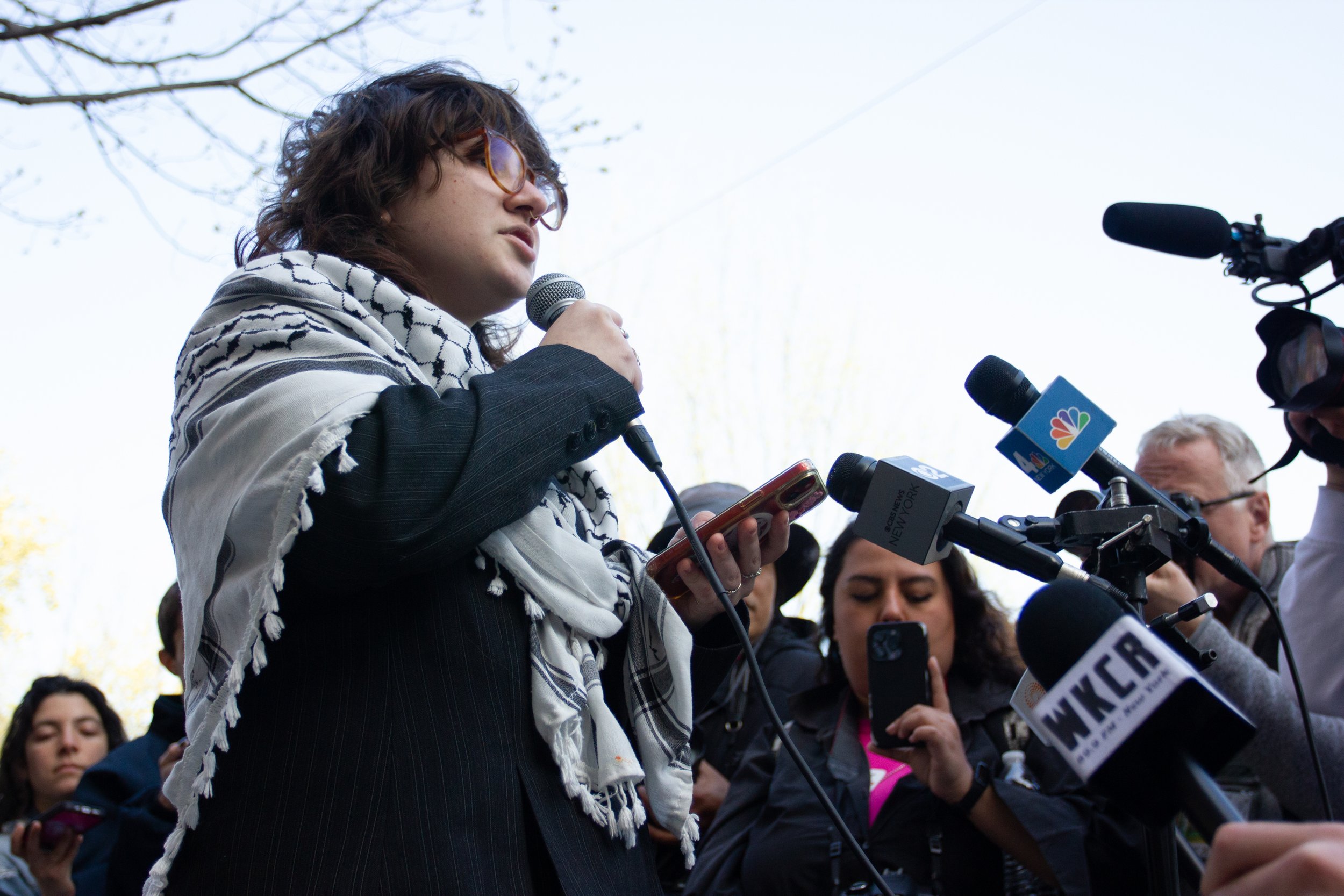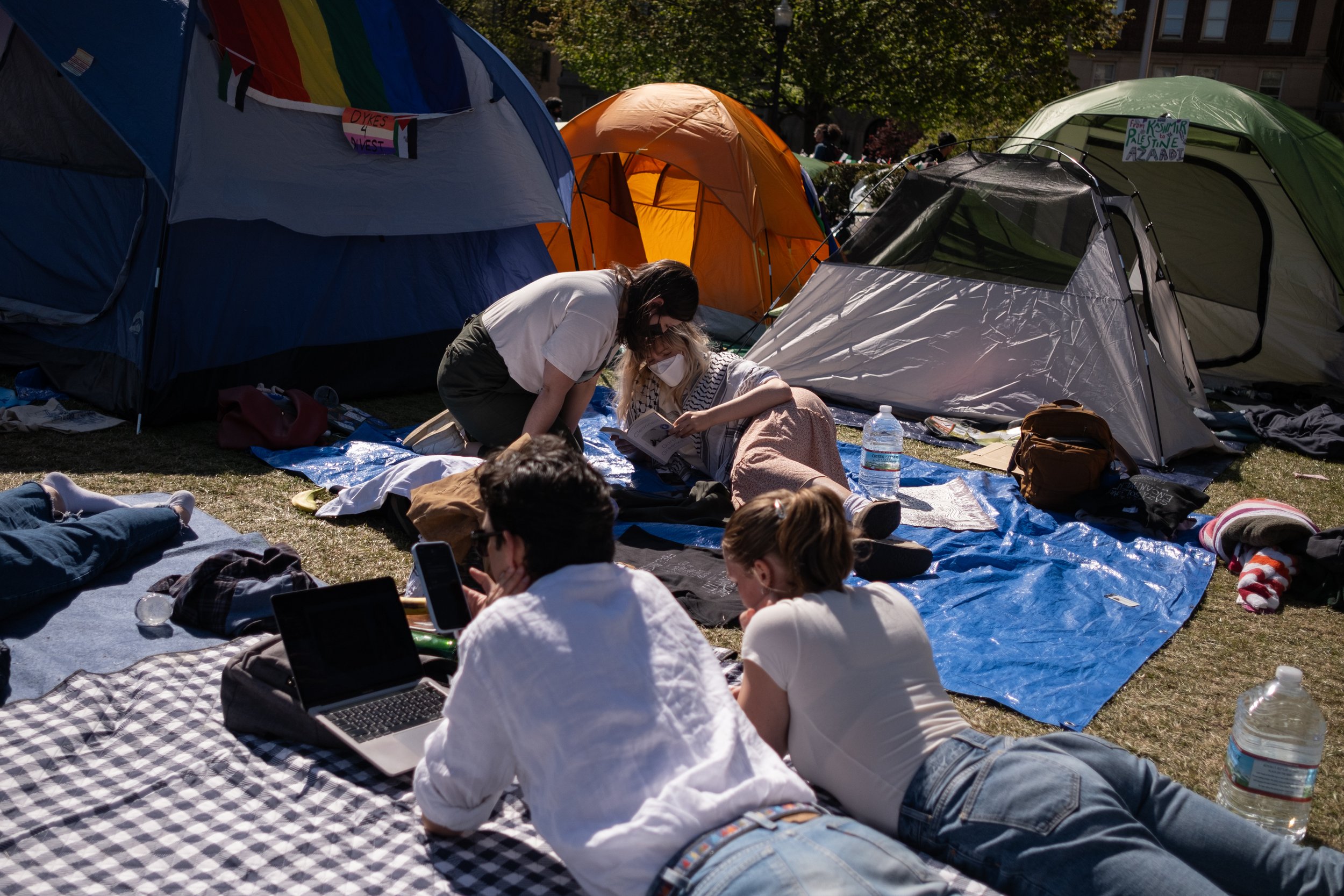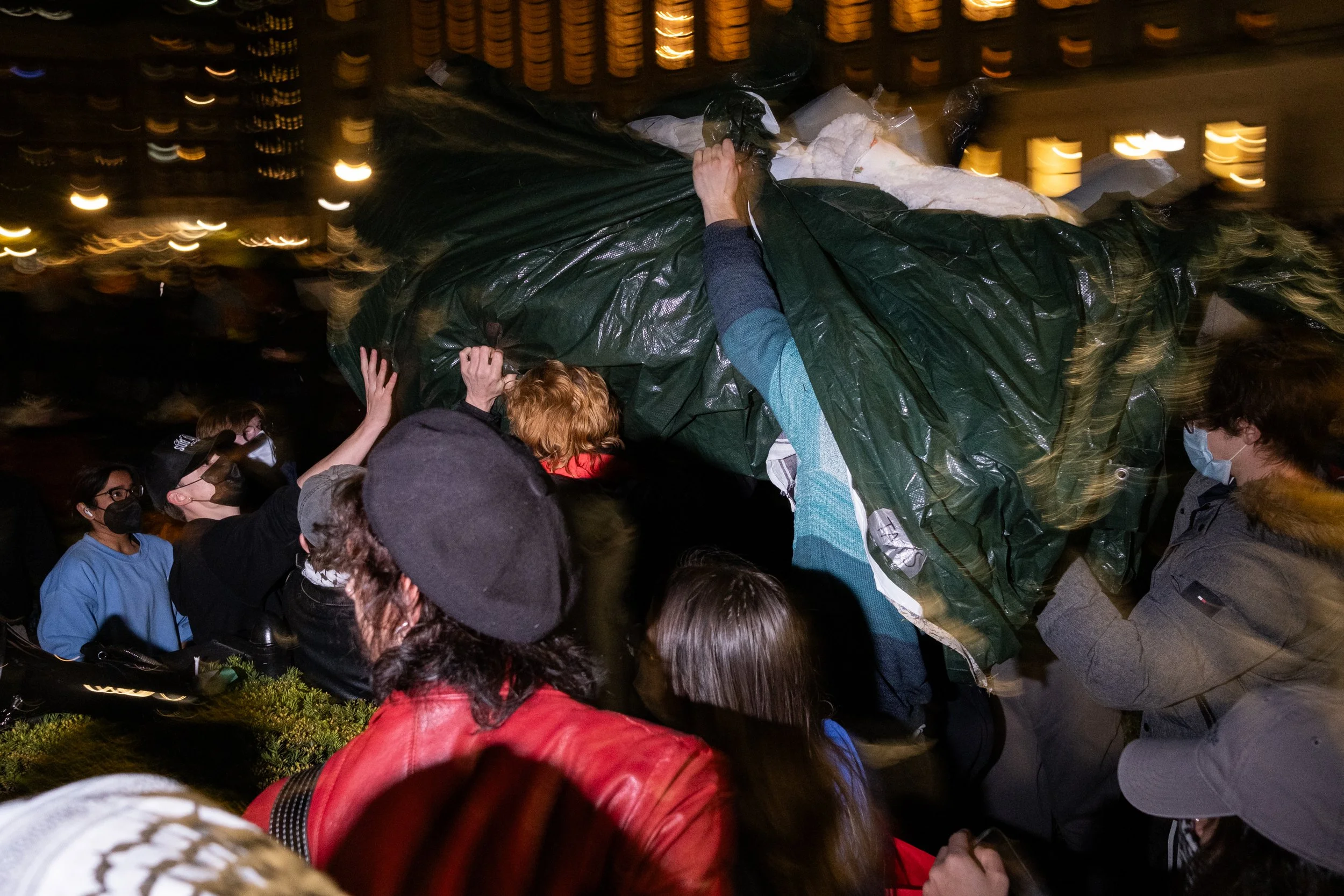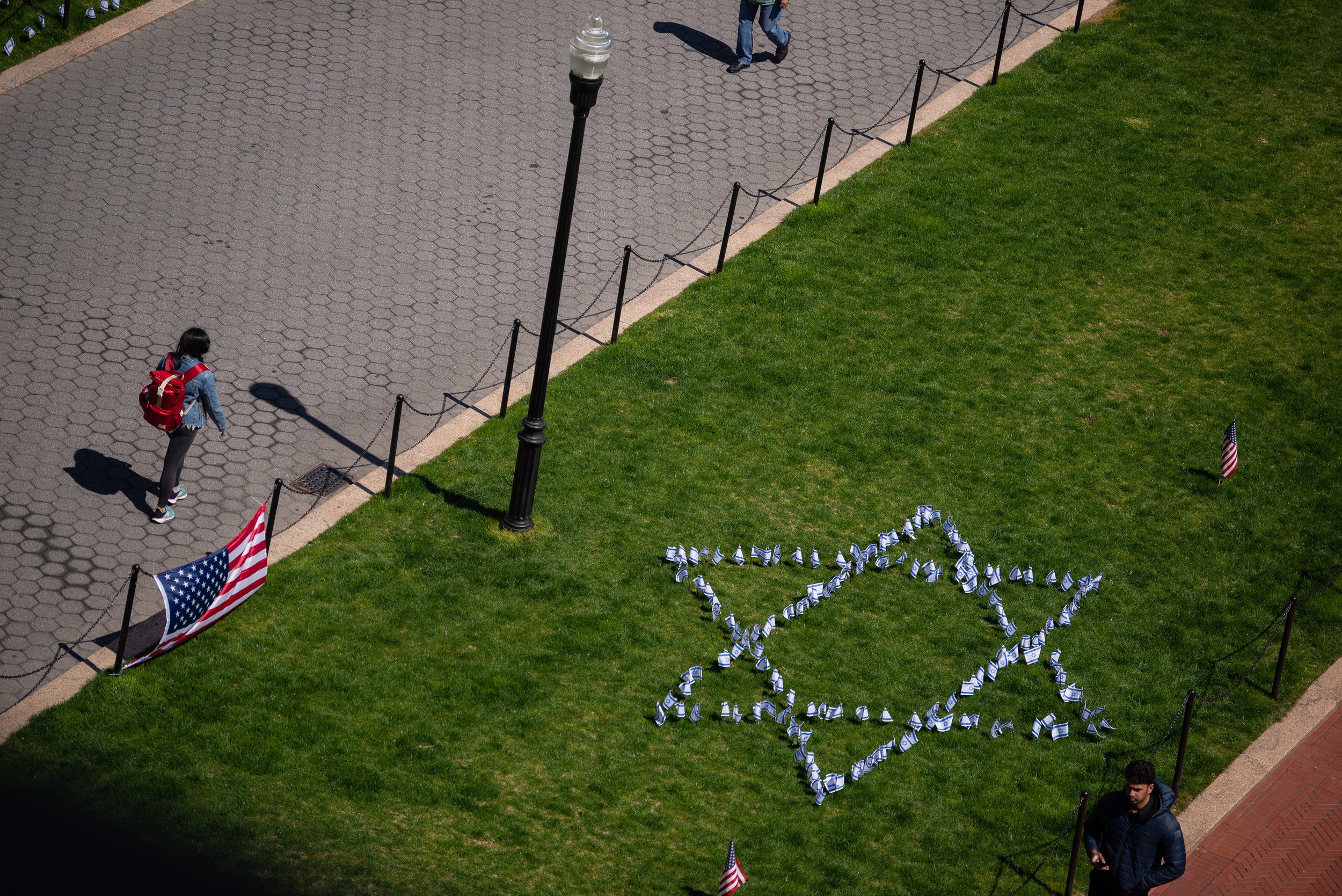
Negotiations and Breakdowns
One of the student representatives of the Columbia-Barnard chapter of Jewish Voice For Peace, Soph Askanase, speaks at a press conference outside of President Minouche Shafik’s home, New York City, April 23, 2024. (Photo by Edward Lopez)
Writers: Anna Oakes, Claire Davenport, Hoda Sherif, Indy Scholtens, Nandhini Srinivasan
Editors: Brendan Rose, Elza Goffaux
Photos: Edward Lopez, Emily Byrski, Marco Postigo Storel, Samaa Khullar, Sofia Mareque
Videos: Emily Byrski
Audio: Sara Selva Ortiz, Claire Davenport
Tuesday, April 23, 2024
On the seventh day of the Gaza Solidarity Encampment, a group of Jewish protesters from Columbia and Barnard held a press conference in front of University President Minouche Shafik’s home on Morningside Drive. More than 15 Jewish students had been arrested, suspended, and evicted on April 18 when the university called the New York City Police Department onto campus.
At the press conference, these protesters spoke about how their Jewish identities were in alignment, not in opposition, with calls for the university to divest from Israel. They also said that joining movements led by other oppressed people and questioning dominant narratives were part of the Jewish tradition. And they restated their demands and solidarity with Gaza.
Columbia students in the Gaza Solidarity Encampment study and have classes on the lawn at Columbia University, in New York City, on Tuesday, April 23, 2024. (Photo by Marco Postigo Storel)
The Jewish students described the backlash they had faced and pushed back against narratives about rampant antisemitism on campus. They suggested these accusations were being instrumentalized by politicians and administrators to distract from their demands and undermine their efforts.
Another speaker was Mahmoud Khalil, a Palestinian student and one of two key negotiators with the administration. Khalil, who grew up in a refugee camp in Syria and is in the United States on an F-1 Visa, said he’d been afraid to protest given the response from the administration. “I did not participate fearing that I would be arrested and ultimately deported from this country,” he said.
Columbia professor Marianne Hirsch, a specialist in Holocaust studies and the daughter of a Holocaust survivor, also spoke. “This is a political movement. It criticizes a state, the state of Israel,” she said. “It is not directed against an identity, which is Jewishness.”
The encampment seen from above at Columbia University, in New York City, April 23, 2024. (Photo by Emily Byrski)
That same day, Palestinian journalist Motaz Azaiza visited the camp, and the protesters opened a “People’s Library for Liberated Learning.” Around 9 p.m. that evening, President Shafik announced a midnight deadline for the negotiations. By the evening of April 23, the encampment had officially been up for over a week, and the devastation in Gaza hit its 200th day.
In a rush of confusion, protesters in the Gaza Solidarity Encampment start to remove certain belongings from the camp. Columbia President Minouche Shafik had just sent an email announcing that the deadline for the occupation to disperse was at midnight, on Tuesday, April 23, 2024. This deadline was later pushed back. (Photo by Marco Postigo Storel)
(Video by Emily Byrski)
The deadline for reaching an agreement was later extended to 8 a.m. Despite this, leaders at the encampment received news of a potential sweep by the NYPD. A speaker took to the megaphone and informed people about how the encampment should react if the NYPD entered campus again.
Protesters were assigned roles based on their willingness to get arrested. “Red” roles were willing to risk arrest, “yellow” roles were willing to support and would try to avoid arrest, and “green” roles would act as witnesses in case of arrests.
Columbia University students watch as Gaza Solidarity Encampment members start to remove certain belongings from the camp, in response to an email by President Minouche Shafik that announced the deadline for the occupation to disperse at midnight, in New York City, on Tuesday, April 23, 2024. (Photo by Edward Lopez)
Protesters began to move tents at around 12:30 a.m., throwing them over the fence facing the Journalism School and then setting them up on a small lawn outside. Encampment leaders set up a lost-and-found area to ensure all belongings were returned to their owners.
The move to the Journalism Lawn was swift and short-lived. Although the crowd control unit of the NYPD was present outside campus, encampment leaders announced that there had been a miscommunication. They emphasized that there was no need to panic and asked green and yellow roles to help with rebuilding the encampment. Red roles were advised to stay in the encampment to protect from any infiltrators and to re-establish security.
Just as swiftly, the encampment returned to the South Lawn. No arrests were made.
The Gaza Solidarity Encampment at Columbia University is partially empty, in New York City, on Tuesday, April 23, 2024. (Photo by Sofia Mareque)
Wednesday, April 24, 2024
On April 24, 2024, U.S. House Speaker Mike Johnson went up to a podium on the steps right in front of Columbia’s Low Library, surrounded by cameras.
He then held a press conference where he called for the resignation of the university president and for a crackdown on the student protesters in the Gaza Solidarity Encampment.
Speaker of the United States House of Representatives Mike Johnson holds a press conference about antisemitism on college campuses at Columbia University, in New York City, on Wednesday, April 24, 2024. (Photo by Marco Postigo Storel)
Johnson went on to say that Jewish students were “chased down and mocked” and faced discrimination from the school. “They are not allowed to come to class anymore for fear of their lives,” he said.
Many Jewish faculty and students were present on campus during the press conference, some as part of the protests and counter-protests.
Johnson seemed to be referencing a decision the university made two days prior to offer hybrid class options to all students through the end of the semester, along with accusations of antisemitism on campus that are still under investigation and have generated controversy and pushback.
A police barricade surrounds a vandalized billboard above the 116th Street Station on Broadway Avenue outside of the Columbia University campus, New York City, April 25, 2024. (Photo by Emily Byrski)
Representative Johnson was welcomed by the boos of protesters who climbed stone benches and piled onto the Alma Mater to get a better look at the Republican delegation of congresspeople.
Johnson was joined by Republican House Representatives Virginia Foxx, Anthony D’Esposito, Mike Lawler, and Nicole Malliotakis. They had just met with President Minouche Shafik.
The congressional delegation came as negotiations between protesters and the administration had reached an impasse. The situation was tense. Protesters alleged that the university had threatened to use the National Guard to tear down the encampments, and were negotiating in bad faith.
Johnson said Hamas had put out an endorsement statement for the protesters, calling them the “future leaders of America,” and that Jewish students and faculty were being targeted by the protesters.
No announcement by the university prohibited or excluded Jewish students from accessing campus at any time.
Johnson called for the arrest of student protesters and said, “I am here today joining my colleagues and calling on President Shafik to resign if she cannot immediately bring order to this chaos.”
When a reporter with the Columbia Journalism School asked Representative Johnson what he had to say about Jewish students who make up a significant part of the student protest movement, who themselves have allegedly faced antisemitic attacks, he did not give a clear answer.
“I’m not sure who the aggressors are, but I would say any of that is inappropriate,” he said. “We believe in the rule of law. That is one of the foundations of America.”
(Video by Emily Byrski)
Pro-Palestine stickers placed by protesters at Columbia University, in New York City, on Wedesnday, April 24, 2024. (Photo by Samaa Khullar)
A student walks past a memorial for Israeli hostages erected next to the encampment, at Columbia University, in New York City, April 24, 2024. (Photo by Edward Lopez)
Thursday, April 25, 2024
Before dawn on April 25, the Columbia administration announced an extension of its negotiation deadline. Protesters would now have 48 hours to reach a settlement with the university.
In the morning, Representative Ilhan Omar visited the encampment with her daughter Isra Hirsi, who had been one of the protesters arrested during the NYPD sweep on April 18. “Contrary to right-wing attacks, these students are joyfully protesting for peace and an end to the genocide taking place in Gaza,” she wrote on X.
Representative Ilhan Omar, center, and her daughter Isra Hirsi, left, visit the Gaza Solidarity Encampment at Columbia University, in New York City, on Thursday, April 25, 2024. Hirsi was one of the students arrested on April 18. (Photo by Marco Postigo Storel)
Columbia University students walk by College Walk where Israeli flags were placed in protest of the Gaza Solidarity Encampment at Columbia University, in New York City, on Thursday, April 25, 2024. (Photo by Marco Postigo Storel)
(Video by Emily Byrski)
That afternoon, pro-Israel students placed hundreds of small Israeli flags across the central campus lawns.
And in the early evening, a scheduled counterprotest called the “United for Israel” rally began. Hundreds of pro-Israel supporters and Christian nationalists marched to the gates at 116th and Amsterdam, climbing up the fence and yelling at onlookers.
The rally was led by right-wing media figures including Sean Feucht, a Christian nationalist musician, and conservative talk show host Eric Metaxas. Christian participants spoke vehemently of their support for Israel.
Pro-Israel supporters climb the gate of Amsterdam Ave., protesting the Gaza Solidarity Encampment at Columbia University, in New York City, on Thursday, April 25. (Photo by Marco Postigo Storel)
Pro-Israel supporters march towards the Amsterdam Ave. entrance to protest the Gaza Solidarity Encampment at Columbia University, in New York City, on Thursday, April 25, 2024. Protesters sang, cursed at students, climbed the gates, and demanded the resignation of President Minouche Shafik. (Photo by Marco Postigo Storel)
As the rally approached the gates of Columbia, protesters were met by pro-Palestinian students. The pro-Israel protesters waved Israeli flags and “Bring Them Home Now” signs, chanting “From the river to the sea, Israel will be free” and singing the Israeli national anthem. Some wore Trump hats and shirts.
The confrontation grew more heated, and police officers had to intervene to physically separate the crowds. Two participants in the United for Israel march were arrested, and multiple incidents of harassment were reported.
Columbia students reported being called racist and homophobic slurs, like “monkey,” “fag,” pedophile,” and “terrorist.” One protester called students inside the Columbia gates “vermin.” Participants in the rally also shouted “Go to Gaza and spend a night there, they’re waiting for you,” and “I hope Hamas rapes you.”
A pro-Israel protester climbs the gates at the 116th St. and Amsterdam Avenue entrance to Columbia University's campus for the “United for Israel March,” in New York City, April 25, 2024. (Photo by Marco Postigo Storel)
Hundreds of pro-Israel protesters crowd the gates at the 116th St. and Amsterdam Avenue entrance to Columbia University's campus for the “United for Israel March,” in New York City, April 25, 2024. Protesters in the rally reportedly harassed and threatened journalists and pro-Palestinian protesters. (Photo by Brendan Rose)
Friday, April 26, 2024
On Friday, April 26, students participating in the encampment said in a statement that they had reached an impasse with the university administration. They said they would stay on the lawn until all demands were met.
The students’ announcement came as President Shafik faced mounting criticism from faculty members across political and ideological spectrums.
The University Senate Executive Committee passed a resolution recommending the establishment of a task force to review and address recent “counterproductive” administrative actions, including violations of academic freedoms and the due process of students and faculty.
The resolution was passed after a long and detailed debate, with 62 votes supporting it, 14 against, and three abstaining.
Encampment demonstrators paint "INTIFADA" on a long banner that will later be hung from a window in Hamilton Hall at Columbia University, in New York City, April 24, 2024. (Photo by Edward Lopez)
The resolution pointed out that the university had ignored its own conduct rules and disciplinary processes regarding the protests, violated protocols, and changed event policies without Senate input.
The report also criticized the university for misrepresenting the Columbia chapters of Students for Justice in Palestine (SJP) and Jewish Voice for Peace (JVP) during their suspension, calling the NYPD to campus multiple times without proper consultation, and failing to stand up against external pressures.
In the meantime, protesters at the Gaza Solidarity encampment continued with the day's program. Representative Alexandria Ocasio-Cortez dropped by.
“Any leader who has called in enforcement and violence on folks that are peacefully organizing should be deeply ashamed of themselves. I would imagine a decision like that would follow a person for a very long time," she told student blog Bwog.
(Video by Emily Byrski)
(Video by Marco Postigo Storel)
Saturday, April 27, 2024
The morning and afternoon were relatively calm on Saturday. By mid-afternoon, Jewish students had set up a Passover table, featuring a basket of matzah, clear containers of salad, sweet fruit and nut mixtures, and generous servings of golden-seasoned rice. A sign on the table read, “Please save for your Kosher Comrades.”
As day turned to night, a University spokesperson and Vice President of Communications, Ben Chang refuted claims of a “lockdown” or evictions, stating that there was “no truth” to these reports and that dialogue between university officials and student protesters was “ongoing.” This came after a joint Instagram post by Columbia University Apartheid Divest (CUAD) and several other accounts circulated online, causing widespread unease among students. The post warned of a campus lockdown and student evictions.
Following Chang’s update, CUAD’s caption was immediately revised to reflect the update on the Instagram platform. The updated caption stated, “Columbia administration has confirmed there will be no impending lockdown or evictions,” and added, “We expect them to uphold their promise.”
The University also canceled its daily press briefing, which was initially planned for 5 p.m., rescheduled to 7 p.m., and ultimately called off 15 minutes before the rescheduled time.
(Video by Emily Byrski)
Later that day, Barnard College reached a resolution with almost all of the roughly 53 students who were placed on interim suspension.
In an email addressed to the entire student body at 10:43 p.m., President Shafik and other Columbia leaders expressed hesitation about calling the police again. Doing so, she said, would be “counterproductive, further inflaming campus tensions, and attracting thousands who could threaten our community.”
Shafik expressed a desire to "see concrete signs of progress tonight [with negotiations] that will lead to a significant improvement in the atmosphere on our Morningside campus."
(Videos by Emily Byrski)
Sunday, April 28, 2024
Sunday was also a quiet day at the encampment. Some protesters painted banners under the sun. Others were reading, benefitting from the recently established “People’s Library for Liberated Learning.” Booklets of “A Civilian’s Guide to Direct Action” lay scattered around the lawn. The encampment kept expanding, and they now had a medic tent where sunscreen, medicine, sanitary pads, and masks could be found.
During the day a Pro-Palestinian car parade passed Columbia’s campus. Neturei Karta, an anti-Zionist Haredi Jewish group, held a protest outside the gates of Columbia’s campus.
Inside the campus, an interfaith service took place. Ayanna Gregory, the daughter of actor, activist, and social critic Dick Gregory, opened and closed the service.
In the evening, protesters gathered to watch a film on the projector: the last lecture Palestinian academic Edward Said gave at Columbia University.















